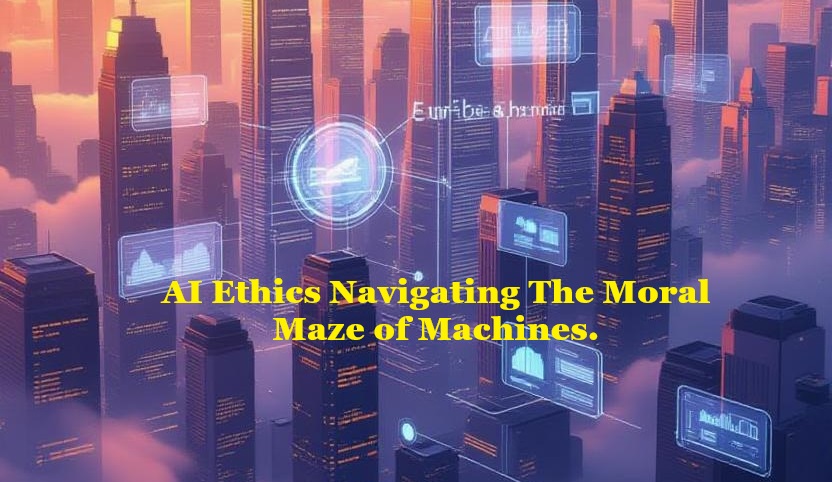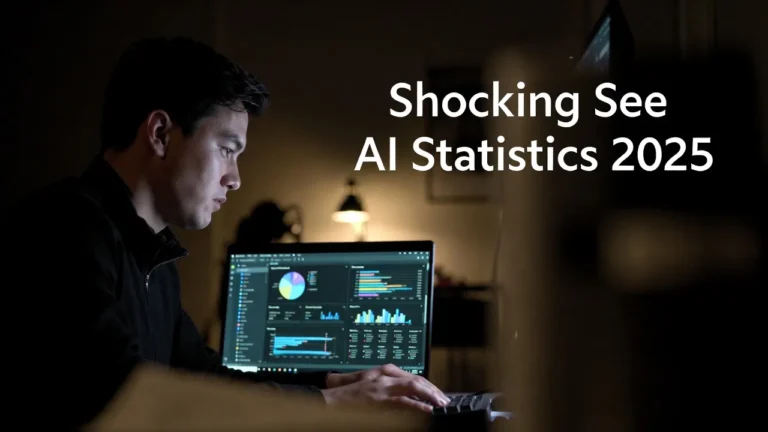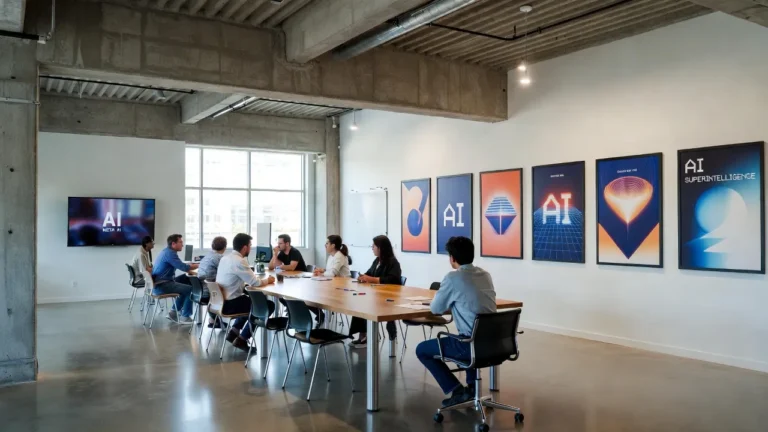
Signature: on6R8pcwgwzZGZnEi7E2StCBAy4jRUh5MBE8ojTPI2AQTn0TCnXMNt4rIYemgpaSXkL5yU8NI61bLQmOqY4I8eLwnFRIu5TmdtT0nHUF282Dl7aV0FC5fwTQ+IAjodobOzbKuTV/g/RKYTh6ctODU7YoYJIhRkd1QI5RvC9Y8Rw=
Hey, tech trailblazers! Imagine a world where AI doesn’t just crunch numbers—it decides who gets a loan, diagnoses your illness, or even influences elections. Sounds revolutionary, right? But here’s the twist: without a strong ethical backbone, that same AI could amplify biases, erode privacy, or unleash chaos like deepfakes that make you question reality.
As we hit October 2025, AI ethics isn’t just a buzzword; it’s the guardrail keeping our digital future from veering off a cliff. In this deep dive, we’ll unpack the thorny issues, spotlight 2025’s biggest risks, explore rock-solid frameworks, and chart a path to responsible innovation. Buckle up—let’s geek out on why ethics is the ultimate AI superpower.
Why AI Ethics Matters More Than Ever in 2025
Flash back to 2024: Explosive growth in generative AI like advanced LLMs flooded our feeds with everything from hyper-realistic art to “hallucinating” chatbots spitting out fake facts. Fast-forward to now, and we’re grappling with the fallout—85% of ethics and compliance teams still lack safeguards for third-party AI tools, leaving businesses exposed to massive fines and trust-eroding scandals.
Issues like privacy breaches, baked-in biases, and opaque “black box” decisions aren’t relics of the past; they’re escalating as AI weaves deeper into hiring, healthcare, and finance. The stakes? Not just buggy code, but societal rifts that could widen inequalities or spark existential debates about machine “understanding.” At its core, AI ethics is about aligning tech with human values—fairness, transparency, and accountability—to ensure AI empowers us, not exploits us.
The Core Ethical Concerns: Where It All Goes Wrong
AI’s promise is huge, but so are its pitfalls. Let’s break down the big four concerns that keep ethicists up at night:
- Fairness and Algorithmic Bias: Picture this: A facial recognition tool that nails white faces but fumbles on people of colour, or a hiring algo that ghosts’ women because its training data skewed male dominated. These aren’t hypotheticals—they’re real-world discriminators rooted in skewed datasets, perpetuating historical prejudices and hitting marginalized groups hardest. Fairness demands diverse data and constant audits to level the playing field.
- Transparency and the Black Box Blues: Ever wonder why an AI denied your loan? Good luck prying that open—most models are inscrutable fortresses of code. This opacity fuels distrust and dodges accountability, but tools like Explainable AI (XAI) are cracking the code, turning “magic” into understandable math.
- Privacy and Autonomy Under Siege: AI gobbles data like candy, risking everything from doxxing via re-identified “anonymous” info to consent-free surveillance. In a post-GDPR world, protecting human rights means baking privacy in from day one—no more “move fast and break trust.”
- Accountability: Who Takes the Fall? When AI goofs (or worse), finger-pointing ensues. Was it the developer, the deployer, or the data? Clear chains of responsibility, audit trails, and appeal rights are non-negotiable to rebuild faith and slap on legal brakes.
These aren’t abstract; they’re the sparks behind scandals like biased credit scoring in low-income neighborhoods or AI-fueled election meddling.
2025’s 7 Biggest AI Risks: The Ticking Time Bombs
Drawing from the governance frontlines, here’s the hit list of threats businesses can’t ignore this year. With 72% of companies already AI-adopting and regs like the EU AI Act ramping up by 2026, ignoring these could cost millions—or your rep.
- Privacy and Data Protection: Massive data hauls invite breaches, like accidental leaks or border-hopping consent nightmares—think 11% of confidential info already slurped into tools like ChatGPT.
- Algorithmic Bias and Discrimination: Uneven training data turns AI into an inequality amplifier; fix it early with diverse sets, or watch lawsuits pile up.
- Security Vulnerabilities: From “prompt injections” tricking models to spill secrets to adversarial hacks flipping outputs, AI’s the new cyber playground for bad actors.
- Regulatory Non-Compliance: Juggling global rules could mean €35M fines—hello, EU AI Act’s tiered risks and watermark mandates.
- Third-Party and Supply Chain Risks: Blind trust in vendors? 20% of orgs skip due diligence, inviting IP leaks or shared blame for flops.
- Intellectual Property Concerns: Training on copyrighted stuff or spitting out patent-busting outputs? It’s a legal minefield in the generative era.
- Workforce and Operational Impacts: Job shake-ups, skill chasms, and over-reliance on AI for big calls—40% of AI code’s already buggy, per scans.
Spot a trend? These risks loop back to ethics, demanding proactive GRC (governance, risk, compliance) to dodge the drama.
Frameworks and Regulations: Your Blueprint for Responsible AI
No ethics without structure—2025’s toolkit is stacked with global guardrails turning ideals into action.
- EU AI Act: The big kahuna, tiering systems by risk (bans social scoring, mandates transparency for high-stakes like biometrics). It complements GDPR, pushing businesses toward self-assessments and fines up to 7% of global revenue—shaping a “Brussels Effect” worldwide.
- NIST AI Risk Management Framework (RMF): U.S.-flavored voluntary vibes, cycling through Govern, Map, Measure, Manage to zap biases and monitor drifts. It’s a fave for its flexibility in audits and safety nets.
- ISO 42001: The gold-standard cert for AI management, weaving ethics into lifecycles with risk smarts and continuous tweaks—think Fieldguide’s audit platform nailing it for scalable trust.
- U.S. Executive Order on AI: Mandates safety checks, content watermarking, and infra shields, echoing California’s deepfake crackdowns and kid-protection laws.
Add a 5-pillar homebrew: Ethics alignment, privacy-by-design, bias controls, explainability, and automated assurance. These aren’t shackles—they’re accelerators for innovation that sticks.
Fresh from 2024: Game-Changers Shaping 2025 Ethics
Last year’s fireworks are this year’s curriculum. In AI ethics classes, profs are revamping around:
- LLM Interpretability: Anthropic’s sparse autoencoders decoded Claude’s “sycophantic praise” feature, proving AI grasps nuance (bye, stochastic parrot myth). But it’s pricey—cue safety probes into scheming models.
- Human-Centered AI: Ditch replacement-mode for empowerment; Stanford and Google’s guides spotlight exercises like organ-donation deciders that amp human smarts, not sideline ’em.
- AI Law and Governance: EU Act’s risk tiers meet California’s patchwork (deepfakes, IP, minors’ media addiction). Heuristics for laws? Scrutinize definitions, penalties, and future-proofing—vague terms risk flops, but rigid ones age badly.
Misc tweaks weave in copyright clashes and privacy perils, keeping classes pulse-pounding.

Building Ethical AI: Your Actionable Playbook
Good intentions? Meh. Structured steps win:
- Nail Core Principles: Lock in fairness, transparency, accountability as your north star.
- Set Up Governance: Ethics committees, escalation paths—don’t wing it.
- Adopt Frameworks: ISO 42001 or EU Act for risk checks and compliance muscle.
- Human in the Loop: Oversight for high-stakes; AI augments, doesn’t autopilot.
- Document Everything: Model cards, data trails—transparency builds empires.
Pro tip: Cross-functional teams (C-suite to coders) and tools like automated audits slash breach costs by 65%.
The Horizon: Ethics as AI’s Secret Sauce
By 2025’s close, expect harmonized regs, watermark wars on deepfakes, and assurance ecosystems booming—think AI ethics insurance. But it starts with us: Developers auditing biases, leaders prioritizing people over profits, and you, reader, demanding better. AI ethics isn’t a hurdle; it’s the edge turning tech from tool to force for good. What’s your take—bias-busting hero or governance guru? Drop a comment, and let’s decode the future together.
Stay curious, stay ethical—TechaDigi out.





